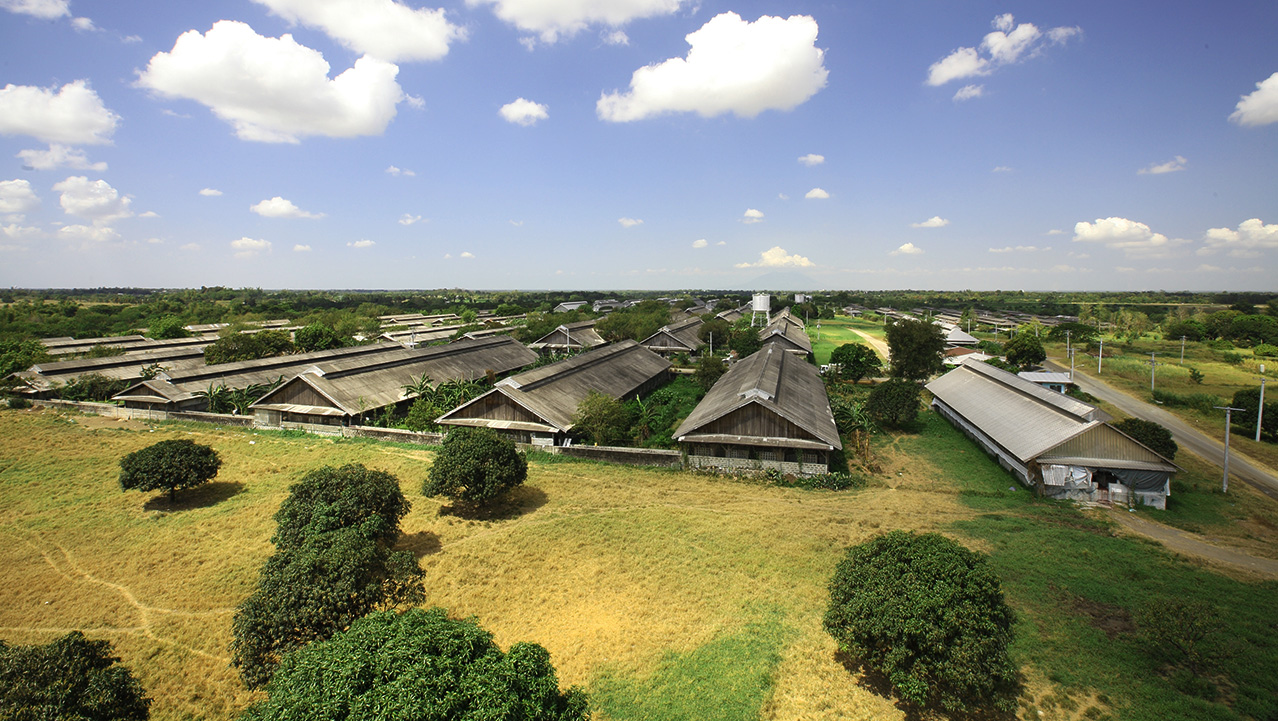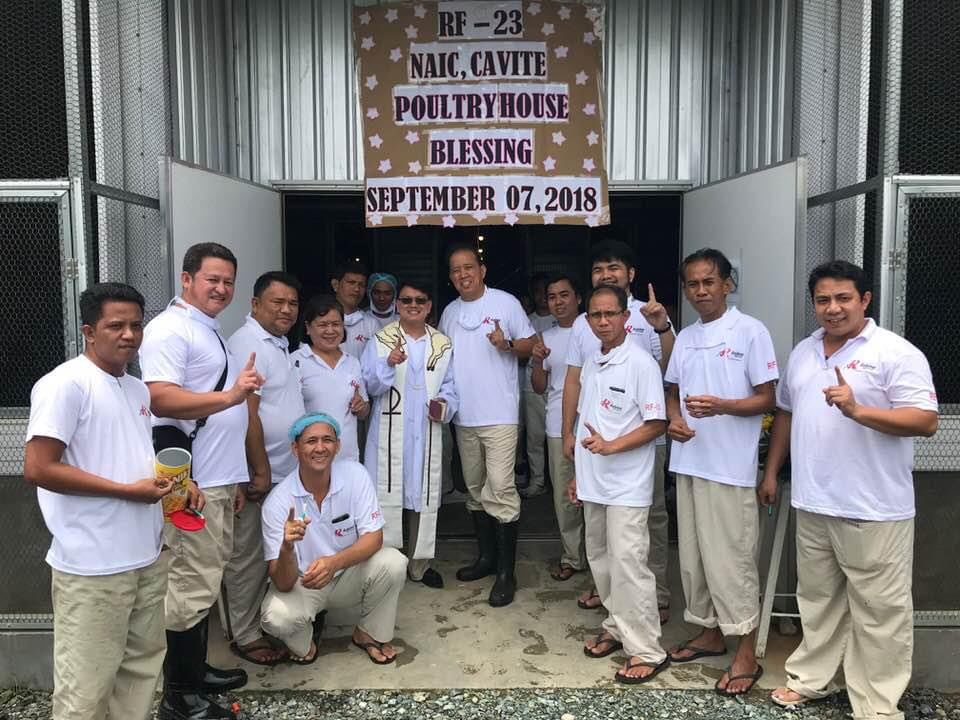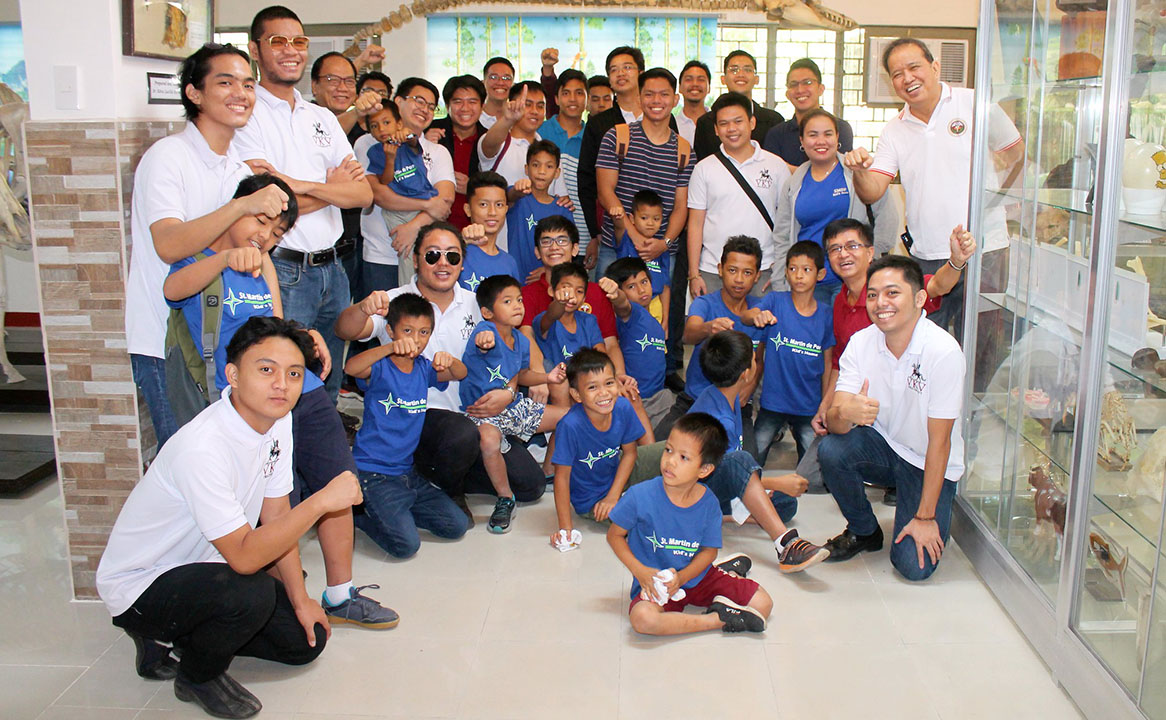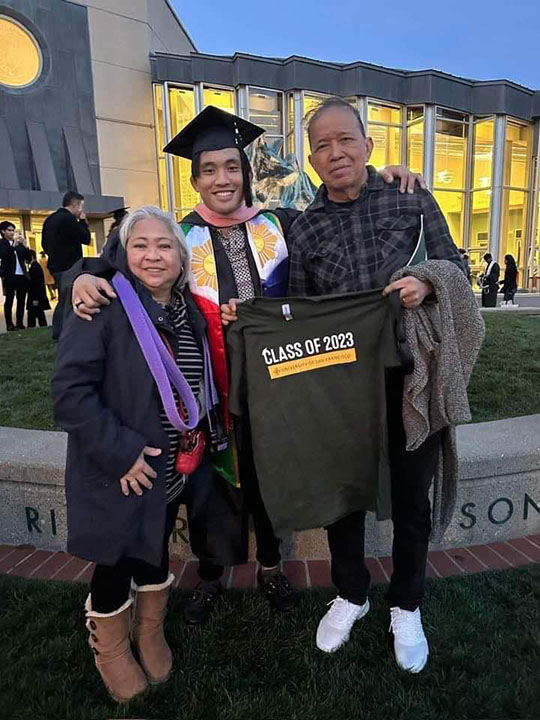It’s a typical busy Wednesday morning on the 45th floor of JG Summit’s headquarters in Pasig. From the glass-walled meeting room where I am to meet Dr. Dante Palabrica, Technical Director of Universal Robina Corporation's Robina Farms, I gaze out to admire the view of the Ortigas skyline and the lush, green treetops lining a nearby golf course. Then, from the corner of my eye, I spy Doc Dante quickly making his way to the meeting room, his long, purposeful strides possessing the energy of a man perhaps half his age.
“You look familiar. We’ve met before, haven’t we,” he asks, squinting his eyes and tilting his head back as we exchange handshakes. I’m shocked he remembers; our last encounter was five years ago, when I interviewed him about the growth of URC’s Agro-Industrial Group.
To say a lot has happened since 2018 would be an understatement, so we have much catching up to do.
The Man, the Myth, the Legend
“I’ve been with the company for 43 years. People call me ‘alamat’ [legend],” says Doc Dante with an ear-to-ear grin. By the time this story is published, that figure would actually be closer to 44, as he came onboard in 1980. For the record, Doc Dante is past the usual URC retirement age, but he’s been requested to extend his stay multiple times due to his vast industry experience, indefatigable dedication to his work, and unique set of skills.
However, he hints that this arrangement could very well be nearing its end. Earlier this year, he began relinquishing some aspects of his daily responsibilities. “Mr. Vincent [Vincent Henry C. Go, Managing Director of URC Agro-Industrial Group and Food Services] told our team, ‘Let’s not stress out Doc Dante anymore.’ So, I began turning over to Rafael ‘Paeng’ Ruiz the operations of our poultry division and the piggery, while Jonathan Dino is now the head of Agri Consumer Sales and Operations.”
‘I’ve been with the company for 43 years. People call me ‘alamat’ [legend],’ says Doc Dante with an ear-to-ear grin.
These days, Doc Dante concentrates on his role as Technical Director of Robina Farms. “I handle the issues of diseases, animal control, medication, and vaccination. I do a lot of thinking and problem solving on the technical side, which I like, and I handle our communications with experts.” That’s still a lot on his plate, but now that a portion of his day-to-day has been freed, he’s been able to attend more industry conferences to keep up with the latest trends and developments in the agri-business sector, as well as give talks to inspire the next generation of Filipino farmers.
The Farming Life
Curious about where Doc Dante’s undeniable passion for the industry began, we ask him about his younger days. We learn that he was the seventh child in a brood of 10, and was raised in Manila by his father, a sugarcane farmer, and his mother, a school vice-principal. “It wasn’t easy raising 10 kids, so my parents said that if we wanted to get a college education, we would all have to study hard so we would be accepted at the University of the Philippines,” recalls Doc Dante.
Entering college, Doc Dante dutifully followed his father’s advice to earn a degree in veterinary medicine. “I wanted to quit after the first month, when I had to perform anatomies on pigs and horses, but I stayed on. Now, I have no regrets.”
Doc Dante’s persistence paid off, and he placed 6th in the Veterinary Board Exams six months after his graduation in 1978. He was already employed when one of his Venerable Knight Veterinarians (VKV) fraternity brothers told him about a job opening at Robichem Laboratories, a Gokongwei-owned company that produced veterinary medicines for Robina Farms, and he immediately jumped at the chance.

He was hired as a technical salesman, and was partnered with a sales agent. “I accompanied him on sales calls, where I would be the one talking about the technical aspects of our products,” explains Doc Dante. After six months, he realized that the agent was earning a commission but he was not. “I told my boss I wanted to go into sales, and he let me. I was newly married in 1980, so I was very driven. I worked really hard, I’d meet my quotas, and I’d visit the farms. I was handling Laguna, Cavite, and Quezon. Because of my background, I really knew what I was doing.”
His work ethic impressed his superiors, and they promoted him to supervisor in charge of Southern Luzon, which covered Bicol, Batangas, and Rizal. “I became the No. 1 in sales,” beams Doc Dante.
The next challenge was when he was assigned to the Visayas and Mindanao, much to the dismay of his wife who was studying in Manila at the time. “I explained to her that I had to do it, to prove that I could thrive in any environment. I was sent to Cebu, and there, with the same passion, I worked hard and traveled to dangerous areas to sell. Again, my team of three guys became No. 1.”
Doc Dante was able to develop Robina Farms’ piggery into one of the country’s largest hog-raising farms – not too long ago it was No. 2 in the country. He considers this his most fulfilling achievement so far.
In due time, Doc Dante was summoned back to Manila, where his reputation as a reliable trouble-shooter was growing. Apart from sales, he was gradually introduced to the operations side of the business, having gained the respect and trust of Johnson Robert Go, who was in charge of Robina Farms at the time. “We only had one type of egg layer at the time, called a shaver, which originated from Canada. Mr. Johnson was convinced we had to get another breed, so we brought in the Hy-Line breed from the U.S. Then, he told me that I was to handle the Hy-Line line on top of my duties with Robichem. Again, I did good.”
When the Robina Farms’ piggery division experienced a few operational hiccups in the 1980s, Mr. Johnson once again called on Doc Dante to right the ship. Over the years, Doc Dante was able to grow the piggery into one of the country’s largest hog-raising farms – not too long ago it was No. 2 in the country. “It was very fulfilling. We had a supply capacity of 1,000 hogs a day. We were able to supply Robinsons Supermarkets, Shopwise, and other major supermarkets.”

The late Mr. Johnson was more than just a boss to Doc Dante, he was considered a second father. “Why have I stayed for 43 years, you ask? Let me tell you,” says Doc Dante as he begins a heartwarming story. “For a long time after getting married, my wife and I weren’t able to have children. So, we went to the U.S. for IVF, and he gave me the plane ticket for free! Our first attempt wasn’t successful, so I asked Mr. Johnson if I could stay just a little longer with my wife to have a second try. He told me, ‘No problem. I’ll take care of your department, you just bring home a baby.’ Now, who wouldn’t be loyal to the company with a boss like that?”
Quickly moving onto another story, Doc Dante shares that when he was thinking of getting a master’s degree early in his career, Mr. Johnson convinced him otherwise. “He told me, ‘You don’t need that. I’ll teach you all the techniques!’” Doc Dante chuckles at the recollection. “What learnings did I get? One is that when you negotiate, you always have to think about your counterpart’s agenda. Two, if it is too good to be true, you have to have some doubt. Three, if it’s not broken, don’t fix it.”
Mr. Johnson told me, ‘No problem. I’ll take care of your department, you just bring home a baby.’ Now, who wouldn’t be loyal to the company with a boss like that?
When we last spoke face-to-face in 2018, Doc Dante had recently overseen the construction of the country’s largest Triple A-certified slaughterhouse and was anticipating Robina Farms’ entry into the export market, but those dreams had to be put on hold due to a viral outbreak. No, not the one you’re thinking of, but something much worse for the livestock industry – the dreaded African Swine Flu, or ASF, which first reached the Philippines in July 2019.
“The Covid pandemic is ‘chicken’ compared to ASF,” laments Doc Dante, who considers the outbreak the most difficult challenge he’s faced in his long career. The disease, he explains, has a grim 99% mortality rate when it infects pigs. “It’s been a struggle, but we’re recovering. The ASF virus is very sticky and hardy. There are over 150 spike proteins that will attach to the animal, so we’re being very, very strict and careful about the biosecurity in our farms.”
Thankfully, Doc Dante says that the business is gradually improving. “One positive thing is we have a good [pig breeding] foundation. We still have the great grandparents’ stock and the grandparents’ stock. If you have good pig breeds, you can repopulate more easily.”
Bringing Sexy Back
This September, Doc Dante was invited to speak at the launch of The Young Farmers Challenge, a financial grant assistance program of the Department of Agriculture’s Agribusiness and Marketing Assistance Service, in collaboration with the office of Senator Imee R. Marcos and the Government Service Insurance System.
In his well-received presentation, Doc Dante expressed his concern that an overwhelming majority of the country’s veterinarians have chosen to devote their careers to the care of pets. “I hate that we are a developing country, and yet 90% of our veterinarians are devoted to small animals. It is hard to get vets these days for farm animals. What benefits do you get from dogs and cats? You can’t eat them! What we need is food: livestock and poultry,” says Doc Dante, mincing no words as usual.
Persuading more veterinarians to service the needs of our farmers is one step towards reviving the country’s agriculture industry, but what else can be done to make farming “sexy” again?
‘The Covid pandemic is ‘chicken’ compared to ASF,’ laments Doc Dante, who considers the outbreak the most difficult challenge he’s faced in his career. The disease, he explains, has a grim 99% mortality rate when it infects pigs.
Doc Dante says it’s going to be tough. “The younger generation has already gotten used to working comfortable jobs,” he says, gesturing toward the people at the office typing away on their computers to underline his point. “It’s a worldwide problem. Less and less people are working in agriculture. When you’re used to working in a nice, air-conditioned office, I bet that even if I pay you twice your salary, you won’t want to work on a farm.”
He continues: “Agribusiness is 3D – dangerous, difficult, and dirty. All the items that I bring with me to the farm, when I go home, they all smell like the pigs. Even the children of farmers, they don’t want to continue this kind of work, they want to have easier lives.”

When pressed for his solution to inspire a new generation of farmers, Doc Dante finally offers, “What we need is better technology. We have to make our farms more efficient, less labor-intensive, yet more productive.”
To illustrate, he mentions Robina Farms’ poultry division. “Before, one person would oversee 5,000 chickens. With process improvements, that person can now handle 40,000. We’re able to make everything mechanized, from the feeding, withdrawing of laid eggs, watering – everything is automated. We have to evolve with technology, not necessarily artificial intelligence, but for the processes.”
Small farmers can also increase efficiency through greater integration, says Doc Dante. After the interview, I learned that integrated farming is a holistic approach that combines different agricultural activities such as crop cultivation, livestock rearing, aquaculture, and agroforestry, within a single farming system. The goal is to optimize the use of resources, increase farm productivity, and promote sustainability. A vertically integrated farm creates synergies among its different components, where outputs from one division serve as inputs for another, leading to increased efficiency and reduced waste.
At Robina Farms, for instance, the amount of excess waste has been greatly reduced after URC invested in biogas facilities. In the process, collected chicken dung is transformed into biogas to power the farm’s electric generators, which has significantly reduced the electricity cost of production. A byproduct of the process can also be used as fertilizer or soil additives in farming, adding to the circularity of operations.
The Future of Food Security
Having been in the agri-business for decades, Doc Dante says that it’s important to realize that some of the traditional ways of farming are no longer viable in the modern age. “The old system won’t work. I’m so focused on modern technology. You don’t need to reinvent the wheel. The technology is there. People just need to open their eyes. I don’t agree with people who say that we can continue to move forward with our native pigs, for example. Our population is increasing each year, so you have to increase the productivity of our livestock.”
Speaking with authority, Doc Dante opines, “Food security depends on us having our own vibrant, competitive business. Agri-business can’t be done like in the past. What do I mean? Before, pigs only had an average of 12 to 14 teats. Now, we’re seeing 16 to 18. In the latest conference that I attended, they expect breeder pigs 10 years from now to have an average of 20.” The implication of this statement is that through selective breeding, sows can rear larger litters of piglets per reproductive cycle, thus greatly improving farm productivity.
His solution to inspire a new generation of farmers? “What we need is better technology. We have to make our farms more efficient, less labor-intensive, yet more productive.”
Another issue that the country needs to address sooner rather than later is our growing reliance on imported food. “We mustn’t rely on importation,” warns Doc Dante. “Look at what happened to rice prices. When India said they would stop their rice exports, Vietnam immediately increased their price by 20%. We need a balanced approach. For instance, if the countries we import pork, beef, poultry or rice from know that we don’t have production of these items, they can dictate the price.”
With the lessons learned from recent outbreaks, Doc Dante suggests more robust vaccination efforts for the country’s livestock are urgently required. “We need to protect our pigs and poultry from ASF and avian flu. Another emerging disease is foot-and-mouth disease, which we eliminated in the 1980s, but it is now hitting Indonesia, Malaysia, and Thailand. We have to be prepared,” he adds.
The Next Chapter
This month, Doc Dante will spend most of his time in the U.S. to join his wife Jo, a special needs teacher in California, as they celebrate their son’s graduation. “Juan Pablo earned his master’s degree in Public Health,” quips the proud father.
Being away from his family for most of the year – he visits them every June and December – has been difficult, but looking at it from a practical point of view, Doc Dante says it’s worked out for the best. “I think my wife was very close to divorcing me when she was still based here,” he says, perhaps only half joking. “Because of the nature of my work, I always had to sleep with my phone close to my chest, but on silent mode. I didn’t want to wake her up when I had to troubleshoot operations at any time of the night.”

The distance, Doc Dante certainly believes, strengthened his relationship with his wife and son. “When my family moved to the States 15 or 16 years ago, it was a blessing in disguise. It allowed me to focus on my work, but it made me miss them more. With my personality, I don’t think I would be able to stay married because I have always been 100% focused on my work.”
A few years ago, Doc Dante began to read books every chance he got, thanks to John Gokongwei Jr. “I read about his advice to devote at least an hour a day to reading books. Since then, I’ve read between 350 and 400 books already.”
After figuring out that he has just a few precious moments for rest and relaxation, it doesn’t shock us anymore when Doc Dante says that he can’t remember the last time he was able to watch a movie in a theater, or for that matter, at home. “I don’t like Netflix, I think it’s a waste of time. If I turn on the TV, it’s to watch CNN, Bloomberg, or the primetime news. That’s all.”
What he does enjoy, though, is reading. “I think I would have liked to be a historian,” he muses. “I enjoy reading biographies, I like reading management books.” According to Doc Dante, he began to read books every chance he got (“Even when it’s late at night and I’m already sleepy”) thanks to John Gokongwei Jr., the late founder of the Gokongwei Group. “I read about his advice to devote at least an hour a day to reading books. Since then, I’ve read between 350 and 400 books already. I’ve had to sell some of them because I don’t have space on my shelf anymore!”
On that note, how will Doc Dante’s next chapter be written? Based on what’s taken place so far, he has carved an impressive legacy of perseverance, selfless duty, and laser-guided focus on his work at Robina Farms and URC-AIG. Whatever happens next, we already know that he won’t give anything less than his best. -- Pierre A. Calasanz


